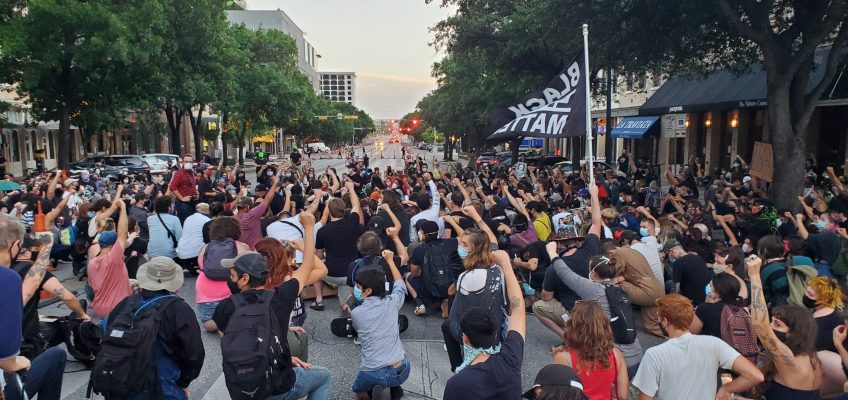On the same day that he received a recommendation from the Texas Board of Pardons and Paroles, Governor Greg Abbott issued a proclamation Thursday granting a full pardon for Daniel Perry, a former United States Army Sergeant who was unanimously convicted of murder in April 2023 for the July 2020 fatal shooting of Garrett Foster, an Air Force veteran who was participating in a Black Lives Matter protest and carrying a rifle in downtown Austin at the time of his death. According to court documents, Perry had previously made racist comments, discussed how he wanted to “hunt” Muslims, and messaged just months before killing Foster: “I might go to Dallas to shoot looters.” The same unsealed documents from his murder case also revealed a less widely reported aspect of his character: Weeks before shooting Foster, he’d sent online messages to an apparent minor in what seemed to be an act of “grooming.”
Abbott’s pardon proclamation did not address Perry’s racist comments, stated desire to kill protesters, or inappropriate messages to an apparent minor—despite Abbott’s expressed concern for the sexualization of children in Texas. On an instant messaging platform, documents show, Perry messaged a self-identified 16-year-old: “No nudes until you are old enough to be of age. … I am going to bed come up with a reason why I should be your boyfriend before I wake up.”
But in his proclamation Abbott did take a pot shot at Democratic Travis County District Attorney José Garza, whose office prosecuted Perry’s case, criticizing Garza’s views on guns and alleging the prosecutor ordered exculpatory evidence withheld. Garza, who won renomination for his office easily this year, has been the repeated target of conservative criticism and even an attempt to remove him from office.
“The Board and the Governor have put their politics over justice and made a mockery of our legal system,” Garza said in a statement. “They should be ashamed of themselves. Their actions are contrary to the law and demonstrate that there are two classes of people in this state where some lives matter and some lives do not.”
Abbott’s office did not immediately respond to a request for comment.
A statement announcing its pardon recommendation from the Texas Board of Pardons and Parole said its “investigative efforts encompassed a meticulous review of pertinent documents” and stated the board recommended “a full pardon and restoration of firearm rights.” Abbott’s pardon fully restored Perry’s rights, including to carry firearms. Perry was freed Thursday.
The pardons board website says that “A full pardon will not be considered for an offender while in prison except when exceptional circumstances exist.” It is presently unclear what exceptional circumstances justified this decision; the board did not respond to questions posed by the Texas Observer.
Abbott and the Republican-controlled Texas Senate, led by Lieutenant Governor Dan Patrick, control who sits on the board that recommended a full pardon for Perry. Abbott first publicly supported pardoning Perry less than one day after Perry was convicted for murder and before he was even sentenced. The move drew criticism from legal experts, who asserted Abbott was politicizing the pardon process.
A crowd gathers in Austin the day after Foster’s death. (Gus Bova)
Whitney Mitchell, who was engaged to Foster before his death at the hands of Perry, laid out her feelings about the pardon in a statement sent to the Observer.
“I loved Garrett Foster. I thought we were going to grow old together. He was the love of my life. He still is. I am heartbroken by this lawlessness,“ she said. “With this pardon, the Governor has desecrated the life of a murdered Texan and US Air Force veteran, and impugned [the] jury’s just verdict. He has declared that Texans who hold political views that are different from his—and different from those in power—can be killed in this State with impunity.”
In a statement, Douglas O’Connell, an attorney for Perry, said the pardons board had conducted a “very thorough investigation” and accused Foster of having “threatened” Perry with a rifle prior to the fatal shooting. (Following the shooting, Perry told a detective: “I believe he was going to aim at me. I didn’t want to give him a chance to aim at me.”) The Travis County jury in 2023 rejected claims of self-defense when it unanimously voted to convict Perry.
In October 2021, the pardons board recommended a posthumous pardon for George Floyd—the man whose murder at the hands of Minneapolis police officer Derrick Chauvin spurred the protest where Perry shot Foster—for a 2004 drug conviction in Houston involving a police officer with a track record of fabricating evidence. But that recommendation was revoked, citing a procedural error.
“I’m extremely disappointed but I’m sadly unsurprised,” Allison Mathis, a longtime public defender in Texas who led the effort to posthumously pardon Floyd, told the Observer the day Perry’s pardon was announced. “I hope that going forward the Governor will make better use of his pardon powers because I think there are a lot of people who are very deserving of pardons, and in the past he’s been very stingy with granting pardons.”


Leave a Reply